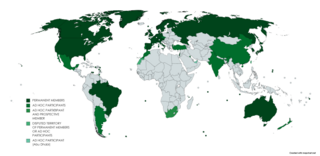Related Research Articles
Bankruptcy is a legal process through which people or other entities who cannot repay debts to creditors may seek relief from some or all of their debts. In most jurisdictions, bankruptcy is imposed by a court order, often initiated by the debtor.
In finance, default is failure to meet the legal obligations of a loan, for example when a home buyer fails to make a mortgage payment, or when a corporation or government fails to pay a bond which has reached maturity. A national or sovereign default is the failure or refusal of a government to repay its national debt.

Debt is an obligation that requires one party, the debtor, to pay money borrowed or otherwise withheld from another party, the creditor. Debt may be owed by sovereign state or country, local government, company, or an individual. Commercial debt is generally subject to contractual terms regarding the amount and timing of repayments of principal and interest. Loans, bonds, notes, and mortgages are all types of debt. In financial accounting, debt is a type of financial transaction, as distinct from equity.

Debt consolidation is a form of debt refinancing that entails taking out one loan to pay off many others. This commonly refers to a personal finance process of individuals addressing high consumer debt, but occasionally it can also refer to a country's fiscal approach to consolidate corporate debt or government debt. The process can secure a lower overall interest rate to the entire debt load and provide the convenience of servicing only one loan or debt.

Accounts receivable, abbreviated as AR or A/R, are legally enforceable claims for payment held by a business for goods supplied or services rendered that customers have ordered but not paid for. The accounts receivable process involves customer onboarding, invoicing, collections, deductions, exception management, and finally, cash posting after the payment is collected.
A country's gross external debt is the liabilities that are owed to nonresidents by residents. The debtors can be governments, corporations or citizens. External debt may be denominated in domestic or foreign currency. It includes amounts owed to private commercial banks, foreign governments, or international financial institutions such as the International Monetary Fund (IMF) and the World Bank.

A country's gross government debt is the financial liabilities of the government sector. Changes in government debt over time reflect primarily borrowing due to past government deficits. A deficit occurs when a government's expenditures exceed revenues. Government debt may be owed to domestic residents, as well as to foreign residents. If owed to foreign residents, that quantity is included in the country's external debt.

Paris Club is a group of major creditor countries aiming to provide a sustainable way to tackle debt problems in debtor countries.

A debtors' prison is a prison for people who are unable to pay debt. Until the mid-19th century, debtors' prisons were a common way to deal with unpaid debt in Western Europe. Destitute people who were unable to pay a court-ordered judgment would be incarcerated in these prisons until they had worked off their debt via labour or secured outside funds to pay the balance. The product of their labour went towards both the costs of their incarceration and their accrued debt. Increasing access and lenience throughout the history of bankruptcy law have made prison terms for unaggravated indigence obsolete over most of the world.
In law and government, appropriation is the act of setting apart something for its application to a particular usage, to the exclusion of all other uses.

Credit card debt results when a client of a credit card company purchases an item or service through the card system. Debt grows through the accrual of interest and penalties when the consumer fails to repay the company for the money they have spent.

Debt collection is the process of pursuing payments of money or other agreed-upon value owed to a creditor. The debtors may be individuals or businesses. An organization that specializes in debt collection is known as a collection agency or debt collector. Most collection agencies operate as agents of creditors and collect debts for a fee or percentage of the total amount owed. Historically, debtors could face debt slavery, debtor's prison, or coercive collection methods. In the 21st century in many countries, legislation regulates debt collectors, and limits harassment and practices deemed unfair.
Repossession, colloquially repo, is a "self-help" type of action in which the party having right of ownership of a property takes the property in question back from the party having right of possession without invoking court proceedings. The property may then be sold by either the financial institution or third party sellers.
An individual voluntary arrangement (IVA) is a formal alternative in England and Wales for individuals wishing to avoid bankruptcy. In Scotland, the equivalent statutory debt solution is known as a protected trust deed.
Debt settlement is a settlement negotiated with a debtor's unsecured creditor. Commonly, creditors agree to forgive a large part of the debt: perhaps around half, though results can vary widely. When settlements are finalized, the terms are put in writing. It is common that the debtor makes one lump-sum payment in exchange for the creditor agreeing that the debt is now cancelled and the matter closed. Some settlements are paid out over a number of months. In either case, as long as the debtor does what is agreed in the negotiation, no outstanding debt will appear on the former debtor's credit report.

Debt management plan (DMP) is an agreement between a debtor and a creditor that addresses the terms of an outstanding debt. This commonly refers to a personal finance process of individuals addressing high consumer debt. Debt management plans help reduce outstanding, unsecured debts over time to help the debtor regain control of finances. The process can secure a lower overall interest rate, longer repayment terms, or an overall reduction in the debt itself.
A protected trust deed, overseen by the Accountant in Bankruptcy, is a voluntary but formal arrangement that is used by Scottish residents where a debtor grants a trust deed in favor of the trustee which transfers their estate to the trustee for the benefit of creditors. Any person wanting to make an application for a protected trust deed must have been a resident of Scotland for at least six months prior to making the application.
Debtors Anonymous (DA) is a twelve-step program for people who want to stop incurring unsecured debt. Collectively they attend more than 500 weekly meetings in fifteen countries, according to data released in 2011. Those who compulsively incur unsecured debt are said to be engaged in compulsive borrowing and are known as compulsive debtors.
A sovereign default is the failure or refusal of the government of a sovereign state to pay back its debt in full when due. Cessation of due payments may either be accompanied by that government's formal declaration that it will not pay its debts (repudiation), or it may be unannounced. A credit rating agency will take into account in its gradings capital, interest, extraneous and procedural defaults, and failures to abide by the terms of bonds or other debt instruments.
Bankruptcy in Irish Law is a legal process, supervised by the High Court whereby the assets of a personal debtor are realised and distributed amongst his or her creditors in cases where the debtor is unable or unwilling to pay his debts.
References
- ↑ Frederiksen, N.K. Long-Term Fiscal Indicators: Sustainability versus Terminal Debt Constraints, Working Paper 14/2005, Danish Ministry of Finance Archived 2012-05-26 at the Wayback Machine Retrieved 4 December 2011.
- ↑ Eichengreen, Barry Institutions for Fiscal Stability, CESifo Economic Studies, Oxford University Press, Volume 50, Issue 1 (2004) Retrieved 4 December 2011